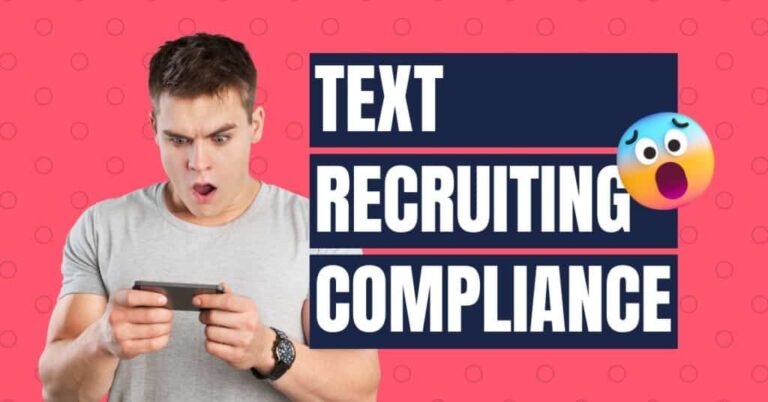
Recruiting with text messages requires compliance with the Telephone Consumer Protection Act (TCPA), a US Federal law, and best practices from the CTIA, a carrier trade association. When sending any text recruiting messages, it’s imperative to know the law and best practices to keep your company compliant, and create the best candidate experience.
Texting quickly becoming the go to way to communicate with employees, job seekers and customers because 95% of text messages are opened and 37% of text messages are returned in 12 minutes.
Advanced text recruiting solutions include features like Apply by Text, that allow candidates to Engage directly with the employer of opted-in texting channels.
All sms communications must be compliant with the Telephone Consumer Protection Act (TCPA). The TCPA regulates telemarketing calls, auto-dialed calls, prerecorded calls, text messages, and unsolicited faxes. Just like “Do Not Call” lists, candidates must have opted-in and opt-out, rights, which GoHire helps to provide and manage.
How Does the TCPA affect Recruiting with SMS?
All text messaging requires TCPA compliance. If you’re considering, or currently using text messaging for recruiting, here are a couple of things you need to know.
First off, like any legal info, this information is broad based, and not considered legal advice. Below, we’ve included an article from Kellie Mitchell Bubeck, Copilevitz & Canter. They know the TCPA.
Second, a lot of recruiters think that “employment” and “recruiting” messages sent via sms / text messaging are not considered “telemarketing” or “advertising” under TCPA, and are therefore exempt, see case law below.
While the Kale Realty case below discusses this, it’s only part of the TCPA. Job seeker must still provided consent and still have the right to opt-out.
GoHire takes a conservative approach to TCPA requirements; requiring Opt-ins, Double-optins, and the ability to remove, or stop communications, via a company-wide TCPA Compliance solution.
Some Recent “Text Recruiting” TCPA rulings:
There’s a very active TCPA plaintiff’s bar, filing class action cases regularly. Each TCPA violation has a penalty of either $500, or $1,500, per text message sent. So, if you send 1,000 text messaging to candidates, that either never gave you consent, or requested to “opt-out”, that could cost you $1.5 million, plus attorney’s fees. As a result, GoHire text recruiting campaigns not only require “opt-ins”, but manages your companies TCPA “Do Not Message” database.
TCPA compliance and Recruitment Messages are not “Advertising” or “Telemarketing” under the TCPA – Kale Realty
In a 2016 case involving Kale Realty, Payton v. Kale Realty, LLC, Case No. 13 C 8002 (N.D. Ill.), the court ruled that “recruiting” is not specifically covered as advertising under the TCPA.
In the case, Kale Realty, a real estate brokerage firm, sent the following sms message to a former associate:
“Kale Realty named 2013 Top 100 Places to Work by Tribune — We pay 100% on sales — reply or visit http://joinkale.com to learn more! Rply 69 to unsubscribe.”
The court ruled the message was not telemarketing or advertising, with the intent to sell a good or service, as defined by the law. See 47 C.F.R. § 64.1200(f)(1) (defining “advertisement” as “any material advertising the commercial availability or quality of any property, goods, or services”) and § 64.1200(f)(12) (defining “telemarketing” as “the initiation of a telephone call or message for the purpose of encouraging the purchase or rental of, or investment in, property, goods, or services”).
The court also ruled that because the plaintiff included their mobile phone number in numerous emails, that express consent was provided.
Uber
Uber was accused of violating the Telephone Consumer Protection Act by text-messaging advertisements without “prior express written consent.”
Sample text messages read “You’re invited to drive Uber. No schedule. No boss. Sign up now and get a $500 bonus.”
Uber claimed that they are not sending ads, but offers of employment, which don’t require written consent. In this case, dismissed in July 2015, U.S. District Court Judge Jon Tigar ruled that “Uber is primarily a transportation business that provides ride services, not a technology business,” and that their text messages were “an attempt to recruit drivers so that those potential drivers could provide services to riders.”
What about those who complete an Uber driver application and gave their cell phone number? Could they state a claim? Judge Tigar said that this was enough to demonstrate consent, even under the FCC’s previous announcements.
“The FCC’s most recent order, released on July 10, 2015, elucidated that there is not a specific method by which a caller must obtain prior express consent, only that the consent must be express and not implied or presumed. See 2015 FCC Order, ¶¶ 49, 52. Express consent can be demonstrated when the called party gives her wireless number to the person initiating the phone call “without instructions to the contrary.” Id., ¶ 52. For the foregoing reasons, the Court agrees with Uber that any plaintiff who provided her phone number as part of the Uber application process consented to receive Uber’s texts about becoming an Uber driver.”
What about Auto-Responses and SMS Chat bots:
FCC Rules that On-Demand Text Messages Do Not Violate the TCPA
On July 10, 2015, the FCC made a declaratory ruling, stating that no longer is TCPA consent disclosures (prior express written consent and that consent is not a condition of purchase) required as long as an SMS autoresponder meets the following criteria:
- The text message is requested by the consumer.
- The text message is a one-time only message sent immediately in response to a specific consumer request.
- The text message contains only the information requested by the consumer with no other marketing or advertising information.
This definition removes any doubt about the ability to auto-respond to consumer initiated messages. But, what about sms recruiting chatbots?
TCPA Text Recruiting Compliance – Federal Law
We contacted Kellie Mitchel Bubeck an attorney in the Kansas City office of Copilevitz & Canter, LLC, who advises clients on federal and state telemarketing laws and First Amendment issues. In particular, Ms. Bubeck provides counsel regarding telemarketing registrations, do-not-call issues, and other consumer protection issues.
She has defended companies in a variety of class and individual actions, including claims alleging violations of the Telephone Consumer Protection Act (TCPA), Telemarketing Sales Rule (TSR), and unauthorized call recording under California’s Invasion of Privacy Act (CIPA).
Copilevitz & Canter provide up-to-date insight into legal issues involving nonprofits, fundraising, telemarketing and political calling.
Here’s some legal insights.
As millennials move away from email for personal communications and rely more heavily on text messaging, employers must take advantage of this change to communicate and recruit younger candidates and employees. Companies and messaging platforms must also ensure they comply with federal calling and texting laws.
The Telephone Consumer Protection Act (TCPA) prohibits autodialed or prerecorded “advertisement” or “telemarketing” calls or texts unless made with the prior express written consent of the recipient. But are genuine offers of employment subject to this restriction?
“Advertisement” means “any material advertising the commercial availability or quality of any property, goods, or services.” The content of the call or text determines if it is an “advertisement,” and the distinction can be small.
For example, a call or text that seeks to hire individuals to sell a company’s products may be an advertisement if the individuals called are encouraged to purchase, rent, or invest in property, goods, or services, during or after the call. But a mere recruitment call is not an advertisement.
The TCPA defines “telemarketing” as “the initiation of a telephone call or message for the purpose of encouraging the purchase or rental of, or investment in, property, goods, or services, which is transmitted to any person.”
Unlike the inquiry as to whether the call is an “advertisement,” the “telemarketing” inquiry focuses on the purpose of the call, rather than its content. The TCPA does not require an explicit mention of the sale of goods or services where the implication of a sale is clear from the context of the call.
A few court cases provide guidance on distinguishing the legality of these calls and texts.
In a 2013 California lawsuit, Friedman v. Torchmark Corp., a consumer alleged that a company sent a prerecorded message inviting him to call a telephone number to attend a recruiting webinar where he could learn about the company’s health insurance products and services in order to sell them. Those who completed the webinar received an email with the opportunity to enter into a contract with the company. The email included fees that the individual would pay to sell its products and in exchange the company would supply client lists.
Even though the messages contained an offer to participate in a free webinar, the court ruled that the webinar was not part of an overall marketing campaign to sell access to the customer database and the messages were not unsolicited advertisements. The court also found that the company’s messages were not “telephone solicitations” because they did not encourage the consumer to invest money in its brokerage services. Rather, the messages were intended to inform him of the opportunity to enter into an independent contract position with the company.
In a 2016 Illinois lawsuit, Dolemba v. Illinois Farmers Insurance Co., Farmers sent a consumer a prerecorded message to invite him to attend a town hall call offering a business opportunity promoting the commercial availability of insurance, goods, intangibles and services. While the consumer argued it was an unsolicited advertisement because the business opportunity required a new agent to purchase goods and services and spend money that benefited the company, the court found that although the call informed the consumer what he would be selling, insurance, without more, did not make the call an advertisement.
In Payton v. Kale Realty, Payton alleged Kale Realty sent unsolicited text messages to his cell phone in violation of the TCPA. The texts stated “Kale Realty named 2013 Top 100 Places to Work by Tribune—We pay 100% on sales—Reply or visit http://joinkale.com to learn more! Rply 68 to unsubscribe.”
But the court held the message received by the consumer was not an advertisement under the TCPA as it contained no reference to the sale of goods or services. The court determined it was irrelevant that the realty company did not hire real estate agents as employees but, rather, sponsored them as independent contractors.
Therefore, genuine offers of employment, as long as the called party is not charged a fee for applying, are not unsolicited “advertisements” as defined in the TCPA.
Messages inviting persons to attend a recruiting webinar wherein they can learn about a company’s products to potentially sell the products is similar to an offer of employment. These calls are also not “advertisements” under the TCPA.
But if the purpose of a call is to encourage the person to make future purchases—even if the calls do not include an explicit mention of a good, product or service—the calls will be considered “telemarketing” calls under the TCPA. Calls to inform persons of opportunities to enter into independent contract positions with a company are not “telemarketing” calls.
Thus, prerecorded calls that include genuine offers of employment are generally permitted to residential lines. These calls are also permitted to cell phones with prior express consent. If you intend to communicate and recruit candidates via text messaging, you should ensure your company campaign and messaging platform comply with federal calling and texting laws including the TCPA.
This article is not a substitute for legal counsel. Each situation is fact specific and you should contact an attorney prior to engaging in any calling campaign. Please contact me if you have further questions.
TCPA Text Messages and Text Recruiting FAQs:
Does TCPA Apply to Text Messages?
The TCPA does apply to text messages in the United States and across all types of sms / texting channels like short codes, ten digit long codes (local ten digit phone numbers… 10DLC), and Toll-Free Numbers.
What are the TCPA Requirements for Text Messages?
The basic TCPA requirements:
- Explicit or Implied Opt-in, depending on the type of message and audience.
- Opt-out automation, via message responses like “Stop”
How Does GoHire maintain client TCPA Compliance?
GoHire provides Optin, Opt-out compliance across all inbound and outbound texting numbers, in alignment with our text messaging carrier partners. We protect clients by requiring “Double Opt-ins” on every first text messaging campaign. When candidates use Text to Apply, GoHire responds with a double-optin messaging. This way, no matter where the candidate originated, each candidate is provided the opportunity to Opt-in, or not.
For more information about Text Recruiting Solutions, please contact a GoHire representative.


 16 February, 2026
16 February, 2026

